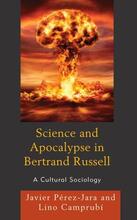CCS Faculty Fellow Javier Pérez-Jara and his co-author Lino Camprubí were recently interviewed about their book, Science and Apocalypse in Bertrand Russell: A Cultural Sociology in El Mundo, the second-largest printed daily newspaper in Spain. The article in El Mundo offers an engaging blend of an interview and a review of the book. It’s always exciting to see cultural sociology featured in a piece for the broader public!
Here are some excerpts from the article, translated into English:
Javier Pérez-Jara and Lino Camprubí, professors at the University of Seville, are the authors of Science and Apocalypse in Bertrand Russell: A Cultural Sociology (Lexington Books/Bloomsbury), a remarkable essay on how Bertrand Russell’s thought influenced the obsession with atomic warfare.
The book is an impressive display of cultural sociology that has yet to be translated into Spanish. Pérez-Jara and Camprubí delve into the thought of the legendary philosopher Bertrand Russell, highlighting how his views on science and technology oscillate between utopia and apocalypse. This analysis, framed within Russell’s historical context, takes on renewed relevance as the war in Ukraine and Vladimir Putin’s constant nuclear threats rekindle old fears that have never fully dissipated from the core of our culture.
Pérez-Jara and Camprubí emphasize Russell’s duality as a rigorous philosopher and a “dramatic intellectual.” In this latter role, they argue, Russell positioned himself as a messianic figure offering narratives of salvation and condemnation—often simplistic but deeply resonant. “Dramatic intellectuals operate within the framework of radical binaries, providing seemingly definitive solutions to the most pressing problems of their time,” the authors explain. Russell embodied this figure by alternating between utopian visions of world peace and apocalyptic visions of nuclear destruction. The authors draw a parallel between Russell and contemporary figures such as Jordan Peterson, who also present themselves as guides in times of crisis. They argue that these figures fulfill a social role akin to that of ancient prophets, drawing sharp boundaries between order and chaos, good and evil, and the sacred and the profane. Their social performances profoundly resonate with their audiences, shaping cultural perceptions and emotions. The case of Russell offers crucial lessons for understanding how cultural narratives shape our perception of existential risks. “Fears of extinction rely more on cultural narratives than on the facts themselves.”
Javier Pérez-Jara and Lino Camprubí invite their readers to rediscover Russell, both as a philosopher and as a public intellectual. By exploring contemporary dilemmas through Russell’s perspective, the authors urge us to reflect on our own ability to confront existential challenges with rigor and creativity. This combination of philosophical and cultural-sociological analysis makes the book a valuable tool for understanding a world in constant flux.
